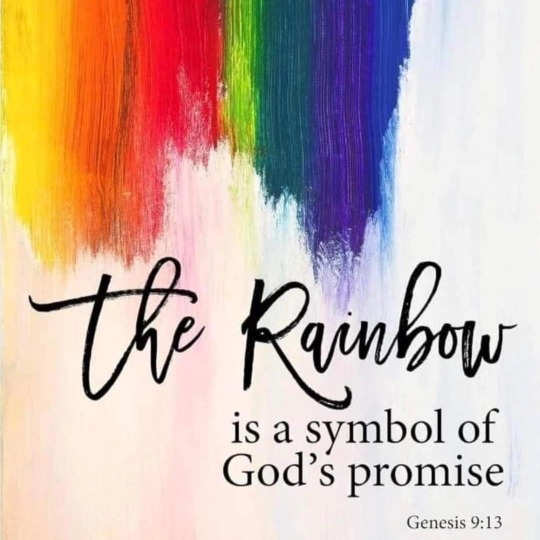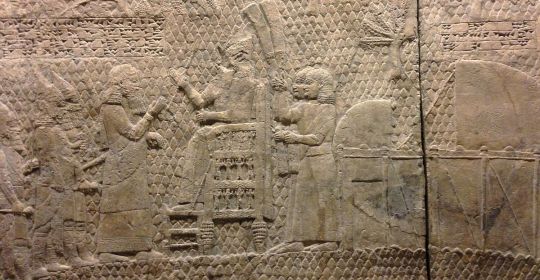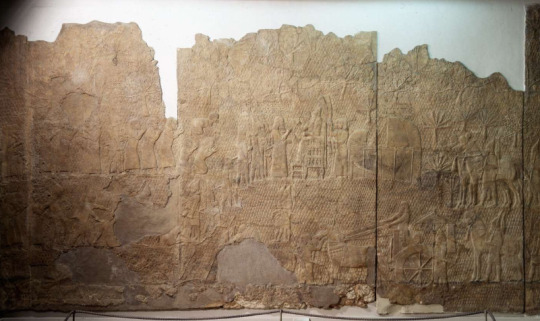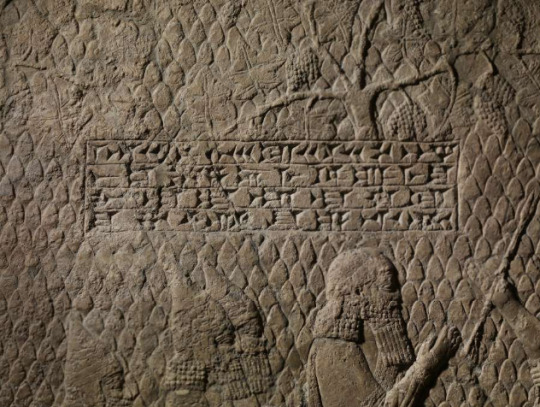#Bible History
Text
71 notes
·
View notes
Text

“When I send clouds over the earth, the rainbow will appear in the clouds, and I will remember my covenant with you and with all living creatures. Never again will the floodwaters destroy all life.”
Genesis 9:14-15 NLT 🌈
The Original Symbolism of the Rainbow, given by the Master Creator, God.
#rainbow#rainbows#god’s promise#promise from god#covenant#promise#flood waters#destruction#cleanse#purg#corruption#for all mankind#life on earth#mankind#humanity#sin#never again#flood#Noah#the ark#bible story#biblical#bible history#historical#great flood#bible verse#holy bible#christian faith#christian blog#christian tumblr
5 notes
·
View notes
Text
I'm reading The Making of Biblical Womanhood by Beth Allison Barr (finally), and I'm on Chapter Two and I'm so fucking mad.
I'm fully on board with what she's saying. I'm mad at patriarchy. A lot of the arguments are familiar to me (I've been egalitarian for years), but the one that's standing out to me and making me rage at the way the church patriarchy has sanitised and obfuscated things, is learning how dang GENDER TRANSGRESSIVE women in the early church were.
"One more piece of evidence that convinces me that the household codes should be read as resistance narratives to Roman patriarchy is how early Christians were perceived by the Roman world: as "gender deviants". . . . Not only did early Christians place women in leadership roles; they meet together on equal footing—men, women, children, and slaves—in the privacy of the home, a traditional female space. Christianity was deviant and immoral because it was perceived as undermining the ideals of Roman masculinity."
Early Christianity was QUEER. It was all about breaking down gender norms of Roman society. Like Paul said "There is neither Jew nor Gentile, neither slave nor free, nor is there male and female, for you are all one in Christ Jesus."
And I'm so mad that we haven't been taught that.
#the making of biblical womanhood#beth allison barr#women in the church#early christianity#queer christian#the apostle paul#ancient rome#roman empire#church history#gender thoughts#gender stuff#feminist christianity#egalitarian#dismantle patriarchy#bible history
7 notes
·
View notes
Text
The Lachish Reliefs
The Lachish reliefs are a set of Assyrian palace reliefs narrating the story of the Assyrian victory over the kingdom of Judah during the siege of Lachish in 701 BCE and carved between 700 and 681 BCE, as a decoration of the South-West Palace of Sennacherib in Nineveh, or modern Iraq.

The reliefs were discovered in 1845–1847 fully covering the walls of the palace at 12 metres (39 ft) wide and 5.10 metres (16.7 ft) long.

This battle is attested to many times within the Hebrew Old Testament, in Isaiah 36:1-2: "In the fourteenth year of King Hezekiah, King Sennacherib of Assyria came up against all the fortified cities of Judah and captured them. The king of Assyria sent the Rabshakeh from Lachish to King Hezekiah at Jerusalem, with a great army. He stood by the conduit of the upper pool on the highway to the Fuller’s Field." (NRSV) and in 2 Chronicles 32:9: "After this, while King Sennacherib of Assyria was at Lachish with all his forces, he sent his servants to Jerusalem to King Hezekiah of Judah and to all the people of Judah that were in Jerusalem..." (NRSV).

8 notes
·
View notes
Text
A while ago, I had a conversation with one of my closest friends in regards to mistranslations or misinterpretations in the Bible. In trying to find mistranslations, I also found some really gay shit in the Bible. I mean, some just absolutely "Yes, homo" stuff, which is pretty much what I'm going to be covering right now.
I'm not going to go over all of them in one post, but let me go over the story of Jonathan and David, the story is found in the Book of Samuel, but one phrase, in particular sticks out and it is from a Mishnah:
“Whenever love depends on some selfish end, when the end passes away, the love passes away; but if it does not depend on some selfish end, it will never pass away. Which love depended on a selfish end? This was the love of Amnon and Tamar. And which did not depend on a selfish end? This was the love of David and Jonathan. (Avot 5:16)"
Before we get into the Bible text, lets study this for a second. The Mishnah does not differentiate between the different forms of love as established by the Greeks (Philia, Pragma, Eros, etc.) so we cannot say with 100% certainty in regards to how they may have viewed each other, but we can safely assume that their relationship was of the purest and truest form of love wherein neither sought anything else from the other and you know, this is your typical bromance kind of thing.
Then it gets really fucking gay.
"As soon as he had finished speaking to Saul, the soul of Jonathan was knit to the soul of David, and Jonathan loved him as his own soul. 2 And Saul took him that day and would not let him return to his father's house. 3 Then Jonathan made a covenant with David, because he loved him as his own soul. 4 And Jonathan stripped himself of the robe that was on him and gave it to David, and his armor, and even his sword and his bow and his belt. 5"
I don't think I need to go too deep into this, but like, yeah. We're gonna do something here. This is from Samuel 1:18, if you were curious, definitely check it out, but for now, we're going to cross reference this with Genesis and the story of Adam and Eve.
I'm not going to 100% copypaste it down like I have the other Bible phrases, but I do want to touch up on that story, in which Eve was created from a "tzela" of Adam. I'm going to be using that instead of the common English translation of "rib" as the word is used in the Torah (Exodus 26 and Ezekial 41) to refer to the sides of a building or a structure. Now, in the context of the Torah, a tzela means just that, the left/right/North/South sides of a building, so we can just look at the original and assume that Eve was created from an entire half of Adam. So, they get together, bone of my bones, flesh of my flesh and they become of one flesh. While this may seem like a bit of a tangent, it's important to look at the words being used here.
Adam and Eve's relationship is stated as being the rejoining of flesh and bone, yet, Jonathan and David's relationship is the binding and conjoining of two souls into one. This is consistent with even a literal translation of the Bible, somehow, these two dudes had a purer and greater form of love than the two original humans. So much more purer, that it was used in the Mishnah oral traditions as an example of what a true love is like. It's absolutely impossible for me to see their relationship as just a bromantic friendship, the wording is just simply too strong to keep it at that. Look at "La Somme le Roi" from AD 1290, these dudes knew, they read the Bible way more than I have and were just "Yeah, no, these guys were like, holding each other in this incredibly just raw and tender way." Like, I've had some homies I've hugged with, but you know, I'm not looking them dead in the eyes with the burning passion of a supernova like I'm about to tongue punch their throats like these two are. I never even held any of my exes like this and you're telling me these dudes are straight? At the very least, they're bi, but come on.
Here's my favourite part, though. It's all too often I've seen reports of people using the Bible to spew homophobia, but while researching this, I found nothing of the sort. I found condemnations for "malakoi" and "arsenkoitai" which is used in the context of weird dudes that spend their weekdays hiding in elementary school bushes. The mistranslation of those words to mean "homosexuals" actually started sometime in 1946-1948. You can read up on it here. Anyway, I'd like to close this by saying that it was an incredibly amazing journey for me to find actual pro-LBGT (I might cover the T part some other day, but yeah, Jesus actually acknowledged the idea of gender being more than just binary). Even more so to actually be able to cross reference some things with Torah and Hebrew oral traditions.
7 notes
·
View notes
Text
Random Fact #6,495
The King James Bible was commissioned by King James VI of Scotland/King James I of England specifically to distract the church from the fact that he had a male lover, George Villiers.
So King James was gay?!
Probably bi, actually, as he did have a mistress too.

#king james bible#did you know#random facts#random fact#little known fact#random factoid#random factoids#yes really#history facts#religion facts#religious history#the bible#christianity#fun facts#lgbt history#pride month#bisexual history#bible facts#bible history#queer history#happy pride 🌈#queer stuff#queer things#england
4 notes
·
View notes
Photo

#childrens books#kids books#Stephen J. Nichols#books#reading#read#book photography#ABCs#Bible history#Church history#Reformation#book shelves#bookshelf#book#photography
4 notes
·
View notes
Text
The Youthful King
Scene: Jeremiah and Ezekiel sitting in their favorite park, enjoying a sunny afternoon. Nearby, a group of teenagers play frisbee and occasionally glance over at the two older men, curious about their animated conversation.
The park was alive with the sounds of laughter and chatter, the perfect setting for one of Jeremiah and Ezekiel’s deep discussions. Sitting on a weathered bench, the two old…
View On WordPress
0 notes
Text
A Journey Through Bible Versions; First Bible In 48 AD, Then Geneva, Scofield/King James, Slave Bible, NIV Versions; What Are Differences? Why Are They Different? Christ's 3 Promises
Isaiah 43:19 Behold, I will do a new thing; now it shall spring forth; shall ye not know it? I will even make a way in the wilderness, and rivers in the desert.
Why did the ‘official’ Christian Bible change from the original “one gospel and eleven books into 73 books and four gospels over time”? https://www.amazon.com/Very-First-Bible-Marcion-Sinope/dp/0578641593
Why are there currently some…

View On WordPress
#bible books#Bible history#Christs 3 promises#Comparing Bible versions#dates#First Bible#Geneva#Gospel#NIV#Scofield/King James#slave bible
1 note
·
View note
Text
youtube
Sodom (1650 BC) Ambient Music
#sodom and gomorrah#lost city#lost civilization#ancient empires#ancient city#ancient civilizations#ancient art#bible#genesis#bible art#bible scripture#bible study#bible story#bible fanart#bible history#bible lore#bible prophecy#bible poetry#bible verse#bible believers#Youtube
0 notes
Text

Happy Saint Patrick's Day 2024! 🙏🏼🍀✝️💐aka St.patrick's day or st.patty's day 2024!
Here are facts about Saint Patrick:
💐 today marks the day of his passing.
🍀 Many people know that this holiday began as a religious feast day to honor the patron saint of Irish Catholics, Patrick, who was born in Roman Britain to Christian parents. Kidnapped by Irish pirates and forced into slavery as a young man, it was during that time he surrendered his life to the Lord. He escaped, returned home briefly and then received religious training in a French monastery.
✝️ Amazingly, he returned to Ireland in 432 AD as a missionary and eventually became a bishop. He was passionate about evangelism and felt that because God freed him from both physical and spiritual slavery, He wanted to bring truth to the people of Ireland, many of whom were enslaved by pagan practices.
More info about today down below.
#st patricks day#saint patricks day#canvaappedits#fun facts#random facts#artist#history#bible history#day of celebration#dayofcelebration#remember#restinpeacestill
0 notes
Text

‘The transfiguration' from 1403, it is in the TretYakov Gallery, Moscow
#hebrew#Russia#black history#Moscow#melanin#Bible history#Bible stuff#art#my ancestors#children of the prophets
45 notes
·
View notes
Text
Unlocking Wisdom and Insight: Engage with Transformative Bible Lessons

Exploring the Depths of Wisdom: An Exploration of Bible Lessons
In a world often tumultuous and uncertain, where questions of purpose, morality, and existence linger heavily, many turn to timeless sources of wisdom for guidance. Among these, the Bible stands as a beacon of light, offering profound insights and transformative lessons that have endured through centuries. Let us embark on a journey through the rich tapestry of Bible lessons, exploring their relevance and significance in our lives today.
The Source of Wisdom
Central to the teachings of the Bible is the concept of wisdom – a divine understanding that transcends human comprehension. Proverbs 9:10 reminds us that "The fear of the Lord is the beginning of wisdom, and knowledge of the Holy One is understanding." Here, wisdom is not merely intellectual prowess but rather a reverent acknowledgment of God's sovereignty and a humble submission to His will.
Lessons in Faith and Trust
Throughout the pages of the Bible, we encounter stories of faith and trust in the face of adversity. From Abraham's willingness to sacrifice his son Isaac to the unwavering faith of Daniel in the lion's den, these narratives exemplify the power of trust in God's promises. Hebrews 11:1 beautifully encapsulates this sentiment: "Now faith is confidence in what we hope for and assurance about what we do not see." Bible lessons on faith inspire us to trust in God's plan, even when the path ahead seems uncertain.
Lessons in Love and Compassion
At the heart of the Bible's teachings lies the commandment to love one another as oneself. In Matthew 22:37-39, Jesus declares, "Love the Lord your God with all your heart and with all your soul and with all your mind... Love your neighbor as yourself." This profound lesson in love and compassion transcends boundaries of race, religion, and creed, calling us to extend grace and mercy to all those we encounter. Through acts of kindness and selflessness, we embody the love that Christ modeled for us, fostering unity and understanding in a divided world.
Lessons in Forgiveness and Redemption
Perhaps one of the most powerful lessons imparted by the Bible is the importance of forgiveness and redemption. In Colossians 3:13, we are urged to "Bear with each other and forgive one another if any of you has a grievance against someone. Forgive as the Lord forgave you." By extending forgiveness to others, we not only release ourselves from the burden of resentment but also mirror God's boundless mercy and grace. Through the redemptive power of Christ's sacrifice, we find healing and restoration, paving the way for reconciliation and renewal in our relationships.
Conclusion: Embracing the Lessons of the Bible
As we reflect on the profound Bible lessons woven throughout the pages of the Bible, we are reminded of its enduring relevance and timeless wisdom. In a world fraught with challenges and uncertainties, the teachings of the Bible offer us a guiding light, illuminating the path to righteousness, peace, and fulfillment. May we heed its lessons with open hearts and receptive minds, embracing the transformative power of God's word in our lives each day.
Also Read:-
Bible History
Bible Principle
Bible Stories
Bible Study
Online Bible
Bible Teachings
Bible Verses
Free Online Bible
Online Bible
Scripture Online
0 notes
Text
Black Obelisk of Shalmaneser III
The Black Obelisk of Shalmaneser III is a black limestone Assyrian sculpture with many scenes in bas-relief and inscriptions which comes from Nimrud, or ancient Kalhu in northern Iraq, and commemorates the deeds of King Shalmaneser III who reigned from 858 to 824 BCE.

The obelisk is historically significant because it is thought to display the earliest ancient depiction of the biblical figure Jehu, King of Israel who appears in the Book of Kings. Some scholars have questioned the traditional identification of "Yaw" as Jehu and instead identify the ruler as another king, Jehoram of Israel. It is also significant for having the first known reference to the Persians.

In the cravings, tribute offerings are shown being brought from identifiable regions and peoples. It was erected as a public monument in 825 BC at a time of civil war, in the central square of Nimrud.




5 notes
·
View notes
Text
2 Chronicles 26
Uzziah was one of the good kings of Judah, one of the kings that served God, but he still committed a sin that led to his demise.
Because Uzziah served the Lord, God made him both mighty and famous (vs. 15). But at some point, Uzziah became proud. He went into the temple to burn incense to the Lord, something that only the priests were allowed to do, according to Mosaic Law.
Uzziah had worshipped God all his life. He certainly knew the law that said that only the priests could burn incense to the Lord, as well as make sacrifices. Why would he choose to disobey God so overtly?
It seems that he saw himself as being above the law. He decided that, since God had made him so mighty, he could do whatever he pleased, worship God however he wanted. This is what most commentators say, and I agree with them, but I also think that the thoughts going through Uzziah's head were more complicated than that, as they often are.
In truth, Uzziah wasn't doing anything different than what we do today- that is, going directly to God to worship Him, instead of going through a priest. Christians who truly understand the Bible know that we don't have to ask a pastor to pray on our behalf, we can pray to God ourselves. We know we can go to God directly.
But the problem was that it wasn't time for that yet, not where offerings and sacrifices were concerned. I think Uzziah understood that God is a personal God that wants to communicate with us directly, but he didn't understand that incense and sacrifices and other offerings were prophetic in nature. All of the Mosaic Law of sacrifice and offerings was meant to foretell the death and resurrection of Christ.
Think not that I am come to destroy the law, or the prophets: I am not come to destroy, but to fulfil.
Matthew 5:17
Until Jesus came to earth to walk among us as a human and then be crucified and rise from the dead, people had no way to atone for their sins outside of offerings and sacrifice. The instructions were so specific that anyone could have followed them, theoretically; but God specified that ONLY the specially sanctioned priests that were descended from Moses' brother Aaron could perform the ritual.
What Uzziah failed to realize was that this was not meant to keep us away from God, but to prophecy the coming of the Messiah. Jesus is the Messiah, the Son of God, the Lamb of God who takes away the sins of the world. Jesus, born hundreds of years after Uzziah's reign, was the one who would fulfill the centuries-old testament of the sacrifice of lambs and young bulls and turtledoves.
In truth, we still can't go to The Father directly. We still have to go through a High Priest:
Seeing then that we have a great high priest, that is passed into the heavens, Jesus the Son of God, let us hold fast our profession. For we have not an high priest which cannot be touched with the feeling of our infirmities; but was in all points tempted like as we are, yet without sin.
Hebrews 4:14-15
This is why we pray in Jesus' name (John 14:13-14). Ending a prayer with "In Jesus' name I pray, Amen," isn't a magic phrase that grants all your wishes. It's submission to God's will.
There is not, never has been, and never will be a way for humanity to reach out to God on our own. Jesus is the bridge between us and God. The Son of God was born and lived a life as a human just so that He could die for our sins and become our living High Priest. The sacrifices of the Old Testament were just that- the old testament, the prophecy, the foreshadowing of Jesus' ultimate sacrifice for all our sins.
Jesus said He is the ONLY way to reach God The Father:
Jesus saith unto him, I am the way, the truth, and the life: no man cometh unto the Father, but by me.
John 14:6
Everyone wants to believe we can reach God on our own, but we really can't, we still can't. We have to go through Jesus.
So when Uzziah went into the temple to offer incense himself, it was really no different than the millions of people today who say they worship God, but have never accepted Jesus' sacrifice on the cross.
Many will say to me in that day, Lord, Lord, have we not prophesied in thy name? and in thy name have cast out devils? and in thy name done many wonderful works? And then will I profess unto them, I never knew you: depart from me, ye that work iniquity.
Matthew 7:22-23
We cannot worship God without going through Jesus.
#bible discussion#bible reference#jesus#salvation#witnessing#kings of judah#israelite history#Bible history
0 notes
Text
https://youtube.com/shorts/watch?vZw-GKfr1TJw
What is the Original Royal Line of Israel?
GOD bless and Keep you. Amen.
#bible history#sanchez family entertainment#Tribe of Benjamin#bible study#christianentertainment#religion
0 notes